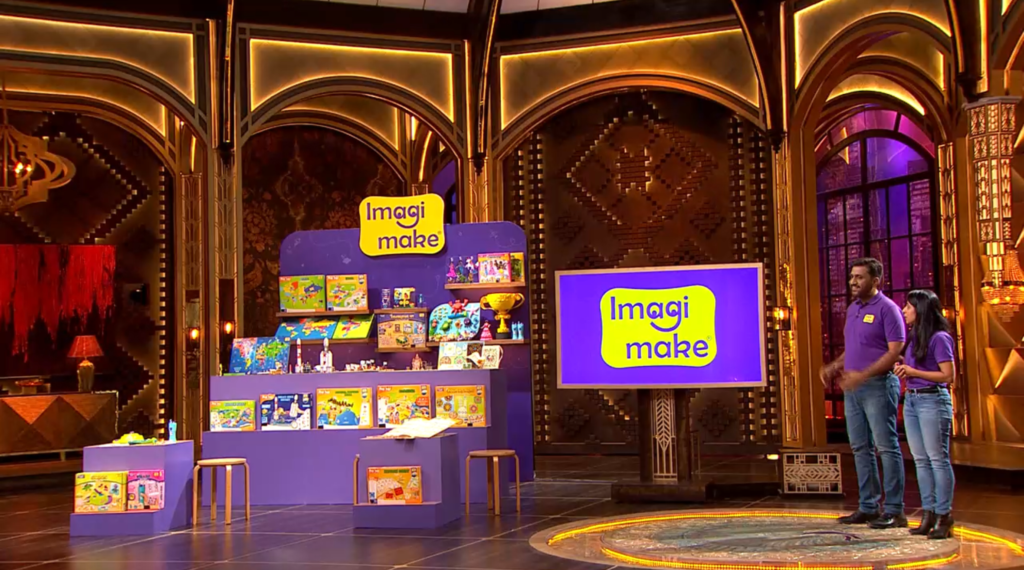SPEED KITCHEN Shark Tank India Season4 Episode7 Pitch1
Speed Kitchen is an Indian startup that provides co-working cloud kitchens designed for delivery-only businesses. Their facilities operate 24/7, 365 days a year. The kitchens are fully compliant with hygiene standards and are ready to use, making it easy for food brands to start quickly. The founder asked for an investment of ₹2 Crore for 3% equity in the company, valuing the business at ₹66.67 Crores.
Speed Kitchen handles all the maintenance of these cloud kitchen spaces. A food brand can start its business in just 4 days with low capital investment. The company operates in 4 cities across India with more than 15 locations. Currently, they support over 50 brands, running more than 130 kitchens in their facilities.
Speed Kitchen was started in March 2021. The company first looks for real estate in prime locations, using factors like Average Order Value, rider availability, and population density to choose the best spot. After that, they do a compliance check and then approach food brands to work with them.
Speed Kitchen offers brands a minimum guarantee and a revenue share deal. The founders mentioned that all their leases are registered, with terms ranging from 3 to 9 years. Brands can run multiple sub-brands from one kitchen space. While brands provide their own equipment, Speed Kitchen takes care of security and maintenance.
| Release Date | 14 January 2025 |
| Founder | Paurav Rastogi & Shamin Kapoor |
| Business | Co-working Kitchen |
| Ask | ₹2 Crores for 3% Equity |
| Valuation/ Networth | ₹66.67 Crores |
| Funding | ₹2 Crore for 6% Equity |
| Sharks | Kunal Bahl, Ritesh Agarwal & Azhar Iqubal |
| Episode | 7 |
SPEED KITCHEN Financials during Shark Tank India?
Speed Kitchen limits its revenue sharing to 1.5X-2.5X of the minimum guarantee. The company will either charge a minimum rent or a revenue share, depending on which amount is higher. Their revenue share is between 6-10% of net sales.
The company gets a return of 15-18% on their capital (ROCE). Speed Kitchen has been profitable since it started. In its first year (FY21-22), they made ₹32 Lakhs, followed by ₹1.51 Crores in FY22-23. They closed the last year with ₹3.25 Crores in revenue and are expecting ₹5.5 Crores this year. By October 2024, they had already made ₹3 Crores.
For FY23-24, their revenue was ₹3.25 Crores with a 4.5% EBITDA and 2.5% profit after taxes. This year, they are expecting an EBITDA of 17%. The company has already raised ₹2.5 Crores at a valuation of ₹20 Crores.
For site-level unit economics, 53% of revenue goes to fixed rental costs, leaving them with a contribution margin (CM1) of 47%. Operational costs, employee expenses, and maintenance take up another 30%, which gives them an EBITDA of 17%. After taxes and other expenses, they typically make a profit of around 11%. They have a churn rate of 10-12% and an 80-85% occupancy rate across their portfolio.
The founders also mentioned that they worked with Chef Ritu Dalmia, who was the main chef at the Ambani wedding, and helped set up the base kitchen. They also collaborate with brands like Haldiram, TFS, Chayoos, and Shark Tank company Daryaganj.
At the time of their Shark Tank pitch, the company still had ₹3.5 Crores in their bank account. They have invested ₹1.5 Crores in capital expenditures (CapEx), with a CapEx of ₹1000 per square foot. Paurav owns 70% of the company, Shamin has 13%, 4.28% is reserved for the ESOP pool, and the remaining shares are with investors.
SPEED KITCHEN Shark Tank India Deals Discussion:
Vineeta dropped out because she felt there wasn’t enough room for growth in EBITDA and PAT with such a high occupancy rate. Ritesh said he could help with real estate issues and offered ₹2.5 Crores for 10% equity in the business. Azhar was also interested, so he asked Ritesh if he could join the deal, and Ritesh agreed.
Kunal praised the founder for their hard work and wanted to help. He made two offers: ₹2 Crores for 8% equity or ₹2.5 Crores for 10% equity in the company. Aman went out because he felt he couldn’t add much value to this business. However, Paurav explained how Aman could help, so Aman offered ₹2 Crores for 10% equity in the company.
The founders took a moment to think and then countered the sharks with two offers: ₹2 Crores for 4% equity, valuing the business at ₹50 Crores, or ₹2.5 Crores for 5% equity. Aman dropped out after this. Ritesh offered ₹2.5 Crores for 7.5% equity and said Azhar would join him. Kunal then revised his offer to ₹3 Crores for 10% equity, and Ritesh matched Kunal’s offer.
The founders asked if all the sharks could join together for ₹2 Crores for 5% equity, but Kunal suggested 6%. The other sharks agreed to this. The entrepreneurs wanted to negotiate further, but Kunal refused. In the end, they shook hands on ₹2 Crores for 6% equity in the company, valuing it at ₹33.33 Crores.
Founder of SPEED KITCHEN
Paurav Rastogi and Shamin Kapoor founded Speed Kitchen. They are both from Delhi. Paurav lived in London, where he saw a co-working kitchen and got the idea. He graduated in civil engineering from VIT, Vellore, and worked at OYO in 2017 as the head of transformation.
Shamin did his bachelor’s degree in Singapore and worked in performance marketing at housing.com.
MUDGAR CLUB Shark Tank India Season4 Episode7 Pitch2
Mudgar Club is an exercise tool similar to Karlakattai in South India, Meel in Iran, and Indian Clubs in the western world. They also make Gada, which is like the Mudgar and has references in Indian mythology. The founder’s goal is to make Mudgar a part of modern life, just like Yoga. To achieve this, they asked for an investment of ₹50 Lakhs for 10% equity, valuing the company at ₹5 Crores.
The founders explained that while dumbbells and barbells allow 2D movements, Mudgar allows people to do 3D movements and swings. The company not only manufactures Mudgar but also teaches the proper techniques for using it. They have 7 products in their lineup.
Mudgar Club shared that making large quantities of Mudgar is challenging, so they focus on creating high-quality products. Their products are made from premium mahogany wood. The company began selling their products in December 2023.
When Mudgar Club started, 95% of their users were male and 5% were female. However, the founder shared that now 70% of their users are female, and 30% are male. All of the company’s revenue comes from social media, where the founder, Anjit, has over 100k followers on Instagram.
| Release Date | 14 January 2025 |
| Founder | Anjit Suhag & Sanjit Suhag |
| Business | Mudgar |
| Ask | ₹50 Lakhs for 10% Equity |
| Valuation/ Networth | ₹5 Crores |
| Funding | ₹50 lakhs for 12.5% Equity |
| Sharks | Ritesh Agarwal |
| Episode | 7 |
MUDGAR CLUB Financials during Shark Tank India?
In the past year, Mudgar Club sold around 5,000 units. One 5KG Mudgar is sold for ₹4,000. Right now, the company is making about ₹10 Lakhs in revenue every month. The founder shared that before July 2024, they were making ₹15-18 Lakhs per month, but sales have dropped because they are focusing more on product development rather than services like before.
Before July 2024, the company was spending ₹4-5 Lakhs on marketing, but the founder said they have reduced this spending to focus on making the business profitable. Currently, they spend ₹1-1.5 Lakhs on marketing each month. The company is now making 30% EBITDA, whereas they were breaking even before July 2024. They have ₹2 Lakhs in their bank account.
To make a Mudgar, the company starts with a 6X6 block of wood from the plant and lets it season for 1 to 1.5 months. After that, they shape and polish it, which takes about a week. They also engrave the student’s name on the product. The cost to make one is around ₹2,000, and all products are made from natural wood.
The company mainly markets on Meta, focusing a lot of its budget on Instagram ads. The business is fully self-funded, and the founders plan to use investment money to build up their inventory.
MUDGAR CLUB Shark Tank India Deals Discussion:
Aman left because he wasn’t sure if the product would become a part of everyday life. Vineeta also left for the same reason. Azhar had the same concerns and decided to exit too. Kunal thought it was too early to invest, so he also decided to leave.
Ritesh wanted to support the business, even though he thought it might take time for the company to succeed. He offered ₹50 Lakhs for 12.5% of the company, valuing it at ₹4 Crores. The founders accepted the offer without much hesitation.
Founder of MUDGAR CLUB
Anjit Suhag and Sanjit Suhag started Mudgar Club. They are from Rohtak, Haryana. Before starting this business, Anjit ran a yoga services company.
To Buy the Product Please Click on the MUDGAR CLUB Product.
Thank you for supporting the blog as we make small commissions on purchases done through the above link.
IMAGIMAKE Shark Tank India Season4 Episode7 Pitch3
Imagimake is an Indian startup that appeared on Shark Tank India Season 4. The company makes games, puzzles, and DIY kits. They sell their products worldwide and have patents in both the US and India. The founders asked for ₹1.5 Crores in exchange for 0.5% of the company, valuing it at ₹300 Crores.
Imagimake started in 2014 and now sells over 1 Lakh units every month. Their products are available online on sites like Amazon and in over 4,000 offline stores. Imagimake toys teach a mix of History, Geography, and Culture. They also have a patented tool that makes quilling easy, hands-free, and mess-free.
The company’s products start at ₹199 and go up to ₹2,000. Their most popular puzzle is the India Map, which helps kids learn about India’s states and geography. They have a total of 120 products, all designed in-house.
The company has 250 workers in their factory who make the products. They also have a team of 20 people handling operations. 40 people work in sales, and another 40 employees manage finance, marketing, and product design.
| Release Date | 14 January 2025 |
| Founder | Ravi Kumar & Disha Katharani |
| Business | Toys |
| Ask | ₹1.5 Crores for 0.5% Equity |
| Valuation/ Networth | ₹300 Crores |
| Funding | No Deal |
| Sharks | No Deal |
| Episode | 7 |
IMAGIMAKE Financials during Shark Tank India?
The founders own 65% of Imagimake. They also have two investors. Their first round of funding was in 2021 from Roha Investments. In their last fundraising, the company was valued at ₹105 Crores and raised a total of ₹20 Crores. At the time of their pitch, they had ₹8 Crores in the bank.
Imagimake earns 35% of its revenue from e-commerce exports, 35% from domestic e-commerce, 12% from quick commerce, and 18% from general and modern trade. 90% of their export revenue comes from the US market.
In FY20-21, the company earned ₹13 Crores in revenue with an EBITDA of ₹15 Lakhs. In FY21-22, they made ₹29 Crores in revenue but had an EBITDA loss of ₹35 Lakhs. In FY22-23, their revenue grew to ₹40 Crores, but they faced an EBITDA loss of ₹90 Lakhs. Last year, they reached ₹56 Crores in revenue with an EBITDA loss of ₹30 Lakhs. For FY24-25, they are expecting to make ₹90 Crores in revenue. By October 2024, they had already made ₹42.5 Crores in revenue with an EBITDA of ₹1.2 Crores, and they expect an EBITDA of ₹2.4 Crores for the year.
The company has ₹8 Crores worth of inventory, ₹5.5 Crores in receivables, and ₹8 Crores in payables. They have invested ₹4-4.5 Crores in their factory. The founders mentioned they need help with the US market due to challenges like high working capital requirements.
IMAGIMAKE Shark Tank India Deals Discussion:
Aman left because he felt the founders didn’t need him. Kunal also left for the same reason. Azhar couldn’t see how he could add value, so he decided to exit too. Vineeta had the same opinion, but she still wanted to make an offer out of respect. She offered ₹50 Lakhs for 0.5% equity and the rest as debt at 10% interest for 3 years.
Ritesh offered ₹1.5 Crores for 1.2% equity, valuing the company at ₹125 Crores. The founders took a moment to think but decided to decline both offers because they didn’t agree with the valuation. The sharks understood, and Imagimake left the tank without a deal.
Founder of IMAGIMAKE
Ravi Kumar and Disha Katharani, a husband and wife duo, founded Imagimake.
To Buy the Product Please Click on the IMAGIMAKE Product.
Thank you for supporting the blog as we make small commissions on purchases done through the above link.


